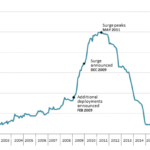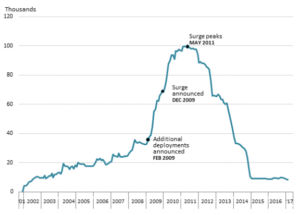Biden to Remove U.S. Troops from Afghanistan


U.S. Troops in Afghanistan 2001-2020
This article was written for L’Anticapitaliste, the weekly newspaper of the New Anticapitalist Party (NPA) of France.
President Joseph Biden announced that the United States will remove its remaining 2,500 soldiers from Afghanistan on September 11, ending the nation’s longest war. The U.S.-Afghanistan War, which has lasted almost twenty years, has cost the United States 2,300 soldiers’ lives and two trillion dollars, while more than 100,000 Afghanis have been killed. Presidents Barack Obama and Donald Trump had also said the U.S. would pull out of the country, though neither carried out the task while in office. Biden seems to be fully committed to ending the war in order to shift U.S. attention and resources to the more important contests with China and Russia.
How did it begin? President George W. Bush announced a “war on terror” after the al-Qaeda’s terrorist attack on the United States on September 11 2001 that killed almost 3,000 people. At the time the Taliban, a fundamentalist Islamic sect, held power over three quarters of Afghanistan and had given a safe haven to Osama in Laden and his al-Qaeda terrorist organization. When the Taliban refused to hand over Bin Laden, the United States launched an invasion that was subsequently joined by the United Nations and the North Atlantic Treaty Organization, with more than 60 nations involved.
Today, for the U.S. government and the U.S. population, the war was no longer so important. The 800,000 U.S. servicemen and women who served in Afghanistan, represent just 0.25 percent of the total population. And although over 20,000 U.S. troops were wounded, that was a small number compared to the 58,000 Americans who died in the 14-year long Vietnam War. Most Americans could just forget the war—and they did. At the same time, no president wanted to end the war, because that would mean recognizing the U.S. military and political defeat in Afghanistan.
In 2003 the U.S. declared war on Iraq, which a had no role in the September 11 attack, an important anti-war movement developed, with demonstrations of more than 100,000 in several cities. With 170,000 U.S. troops in Iraq in 2007 and 90,000 troops in Afghanistan in 2011, the movement grew. Then, with the election of Obama in 2008, who ran as an anti-war candidate, followed by both the killing of Bin Laden and the end of the war in Iraq in 2011, the U.S. anti-war movement declined and became insignificant. After 2015, when the United States had succeeded in holding the Taliban in check and driving al-Qaeda out of Afghanistan, troops there were drawn down from 100,000 to just a few thousand. Trump actually ran as an anti-war candidate, promising to end America’s endless wars and attempts at regime change in other countries. Trump even signed an agreement with the Taliban to withdraw U.S. troops by May 1 of this year, which Biden has now extended to September.
While Senator Bernie Sanders has backed Biden, a number of both Republican and Democratic party leaders are critical of Biden’s decision for a variety of reasons. First, they fear that the Afghan government, created by the United States, will quickly collapse and the Taliban will take power. Second, if the Taliban take power, critics fear the United States will be unable to monitor and fight Islamic extremism in the region. Third, others argue that a Taliban government will restrict women’s rights and persecute non-Pushtun peoples. There is also fear that these changes in Afghanistan might lead to a resurgence of militant Islam in Pakistan, destabilizing that nuclear power. More immediately, the Taliban say they will take military action against U.S. troops that remain after the May 1 date they agreed to with the Trump administration.
Since the United States became the world’s largest oil producer, thanks to fracking, and is now turning to non-carbon energy sources, Afghanistan, Iraq, and the entire Middle East are no longer quite as important to the American capitalist class. The U.S. ruling class now turns its attention to its greatest economic competitor: China.